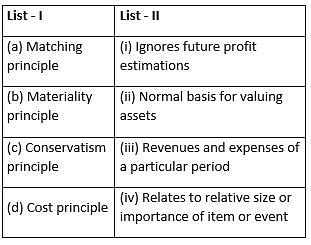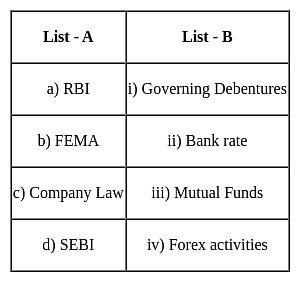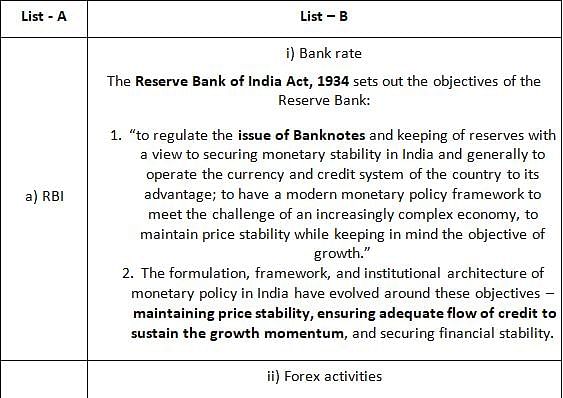TS SET Paper 2 Mock Test - 6 (Commerce) - TS TET MCQ
30 Questions MCQ Test - TS SET Paper 2 Mock Test - 6 (Commerce)
When prices show a rising trend, which one of the following methods of inventory valuation will result in lower income and lower valuation of inventory ?
Which of the following act was created from the sections of the Indian Contract Act 1872?
| 1 Crore+ students have signed up on EduRev. Have you? Download the App |
Given below are two statements, one labeled as Assertion (A) and the other labeled as Reason (R) Read the statements and choose the correct answer using the code given below.
Assertion (A): Purchase decisions are not based on how customers perceive prices but on the marketer’s stated price.
Reason(R): Customers may have a lower price threshold, below which prices signal inferior or unacceptable quality, and an upper price threshold where the product appears not worth the money.
Identify the principles of trade policy framework from the followings under the WTO:
(A) Reciprocity and transparent
(B) Benefactory and resilient
(C) Non-discriminatory
(D) Binding and enforceable commitments
(E) Protective and benevolent
Choose the correct answer from the options given below:
Mr. Shushant is the owner of a house, the details of which are given below the gross annual value would be __________ Municipal value Rs. 36,000 Actual rent Rs 32,000 Fair Rent Rs. 36,000 Standard Rent Rs. 40,000.
Which of these approaches argues that there is no single best way to manage behavior?
The basic conditions for determining the residential status of an individual are :
What does the statement of change in financial position show?
Which among the following can be inferred from the sentence – “It is, however, worth considering whether the Department of Promotion of Industry and Internal Trade (then DIPP) will strike the right balance between regulating consumer interests and encouraging innovation and investment, without discriminating against a particular class of investors”?
Which among the following should be placed in the blank (A) in order to make the sentence meaningful?
Which among the following is correct regarding the prospect of the e-commerce sector in India?
Which among the following is/are the problem(s) faced by e-commerce customers in India these days, as stated in the passage?
I. They do not get the money back easily in case they have to return the products delivered to them.
II. They have no credible information regarding the products and the feedback regarding them available to them.
III. They have to pay extra to ship the products directly to their homes as they do not need to come out for shopping.
In supply chain management, what does the term "cross-docking" refer to?
In which of the following years was ADB (Asian Development Bank) established?
What assumption is being made when we use the t-distribution to perform a hypothesis test?
Consider the following statements:
1. Workmen's compensation and third party insurance are examples of guarantee insurance.
2. Reinsurance is more prevalent in fire and marine insurance.
Which of the above statements is/are correct.
























